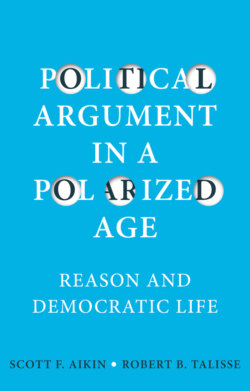Читать книгу Political Argument in a Polarized Age - Scott F. Aikin - Страница 11
Civility in Political Disagreement
ОглавлениеOur aim in this book is to identify the nature of proper political disagreement among democratic citizens. For simplicity’s sake, we will refer to the dispositions appropriate for democratic citizens engaged in political disagreement as the virtues of civility. Often, we will talk about civil political disagreement; sometimes we refer simply to civility. We will occasionally talk of a citizen’s duty of civility, which is the duty to cultivate and exhibit civility in contexts of political disagreement. We employ the term civility with some degree of trepidation, as it is freighted with associations that we reject. So a few preliminary marks about the term are in order.
As commonly used in talking about politics, the term civility denotes a mild or accommodating mode of behavior, and this includes a posture of politeness and a pacifying or gentle tone of voice. Civility in this sense is inconsistent with heated and exercised argumentation, loud speech, and expressions of antagonism of any kind. Accordingly, civility has been subjected to a good deal of forceful criticism among political thinkers. Taken in its usual sense, civility unduly favors the status quo by placing heavy burdens on those who feel most aggrieved by the way things are, and then privileges those who are already advantaged by the kind of upbringing and education that enables them to sustain a calm demeanor and tone of voice amidst conflict. Indeed, it is common among feminist political theorists to reject appeals to civility as inherently patriarchal, as condemning the excitability and emotionality that traditionally has been associated with women.
These objections to civility strike us as correct. And yet our view is that democratic citizens have a duty of civility when engaging in political disagreement. The apparent contradiction is dispelled by the fact that we use the term civility in a different sense than the one that is targeted in these criticisms. We do not contend that proper democratic disagreement requires citizens to always maintain a posture of calmness or politeness, or a pacifying and gentle tone of voice. Civil political disagreement is, after all, real disagreement. And so the heat and passion of disputes over things that matter are consistent with the kind of civility we are calling for. Citizens can be civil and yet raise their voices, engage in sharp or biting rhetoric, and adopt an antagonist posture toward others. Civility is a set of dispositions we bring to contexts of disagreement; it is not a requirement for resignation or conciliation. It’s not about being nice, it’s about disagreeing and arguing properly.
To be sure, the central aim of this book is to present a workable conception of civility. But to put things very roughly, civility is that set of dispositions that enable citizens to manifest their commitment to the political equality of their political opponents amidst political disagreement over matters in which they are invested. In part, civility is set of attitudes associated with engaging earnestly and fairly with the arguments and perspectives presented by one’s opponents. In political argument, civility involves engaging with one’s interlocutor’s actual views rather than with convenient distortions of them, honestly addressing their reasons, declining to take cheap shots, and so on. Civility is also readiness to offer to one’s interlocutors in political disagreement reasons and arguments that one sincerely believes they could appreciate the force of. That is, when disagreeing civilly, interlocutors actually address each other; they do not use the argumentative interaction as merely a tactical contest to stump or “own” a critic. Finally, when political disagreement is civil, interlocutors aspire not only to convince others of the correctness of their own position, they also seek to deepen everyone’s comprehension of the matter in dispute. This means that when arguing civilly, disputants do not seek merely to win converts, and they do not use the exchange as an occasion simply to mug to an audience of sympathetic onlookers.
In short, civility in the sense we will use it here names the collection of tendencies that are necessary for political disagreement to yield enhanced understanding of the point in dispute, even if not agreement. Again, civility in this sense is obviously consistent with raising one’s voice, offering sharp rebuttals to one’s critics, and adopting a combative tone. In order to be civil, one needn’t be soft-spoken, calm, or resigning; one needs rather to argue honestly.
